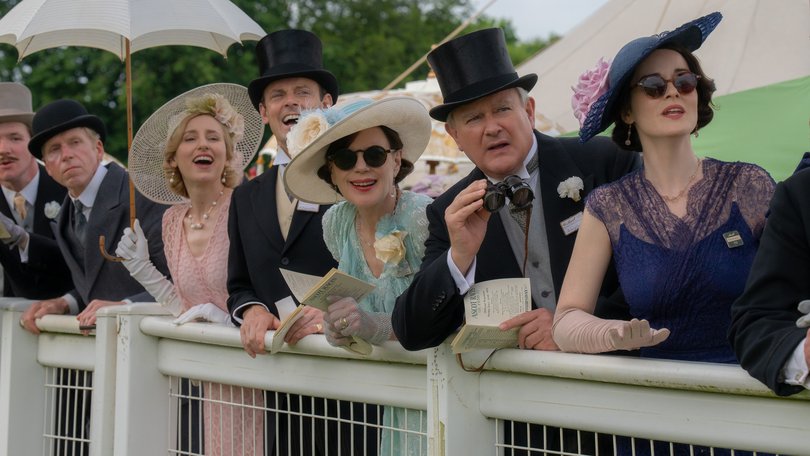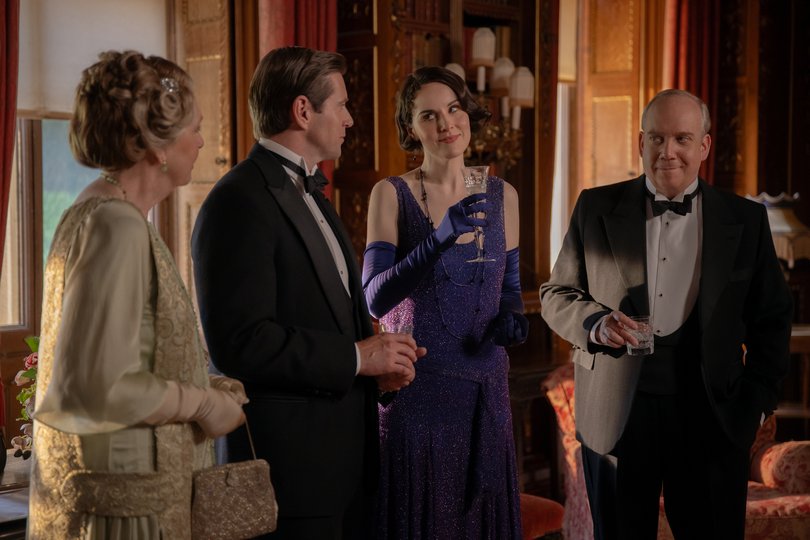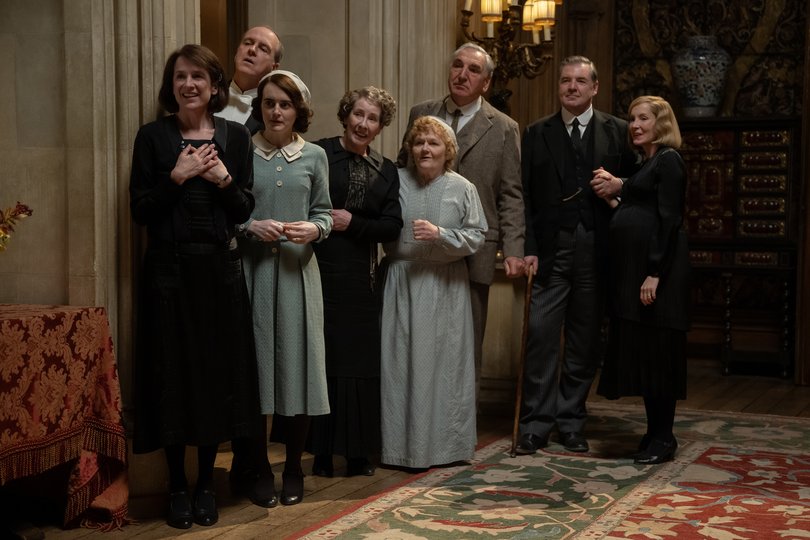THE WASHINGTON POST: Downton Abbey Grand Finale goes out with an upper-class whimper
WASHINGTON POST: Coming 10 years after Downton Abbey’s final season and three years after the last big-screen sequel, Grand Finale is simply nostalgic for its own nostalgia, and more of a whimper than a bang.

If I may borrow an idea from the French philosopher Jean Baudrillard for a moment, Downton Abbey: The Grand Finale is a simulacrum, a faithful copy of something that never actually existed.
In fact, the new movie could be defined as a simulacrum of a simulacrum, since it’s a reiteration of the beloved 2010-2015 ITV/PBS series that itself took place in a version of post-Edwardian England that had no reality outside of a Beatrix Potter children’s book.
Coming 10 years after the show’s final season and three years after the last big-screen sequel, Grand Finale is simply nostalgic for its own nostalgia — for the pleasure viewers took in the estates, titles, gowns and goings-on of a stifling class system with which they had no firsthand experience. And that’s okay. But at this point, any new Downton Abbey is a Xerox of a facsimile of a tracing of a copy.
Sign up to The Nightly's newsletters.
Get the first look at the digital newspaper, curated daily stories and breaking headlines delivered to your inbox.
By continuing you agree to our Terms and Privacy Policy.Is it any good, you want to know? A reasonable question, and the answer is that you’ll find it passable entertainment if you’ve invested enough time and emotion in the dramas of Lady Mary Crawley (Michelle Dockery); her father, Robert Crawley, the Seventh Earl of Grantham (Hugh Bonneville); his American wife, Cora (Elizabeth McGovern); head butler Mr Carson (Jim Carter); Mrs Hughes the housekeeper (Phyllis Logan); and the dozens of others who have come and gone through the halls of Downton Abbey (a character in its own right, played by the 1679 country house Highclere Castle in Hampshire).
If you haven’t invested the time or have moved on to more pressing issues, like Season 3 of The Gilded Age, Grand Finale will seem more of a whimper than a bang.
Directed, as was 2022’s Downton Abbey: A New Era, by Simon Curtis and written, as ever, by Julian Fellowes, the new movie suffers greatly from a shortage of Maggie Smith, whose Dowager Countess had all the spit and vinegar the rest of the family lacked and who capped off the previous movie by dying.
Smith herself died in 2024, and the only relic of her is an imposing portrait of the Countess in the main hallway, gazing at her descendants with a vague air of disappointment.

Her absence, however, allows Lady Mary to assume more of the spotlight, and Dockery steps into it with elegance, verve and Anna Robbins’s soigné evening gowns.
The big scandal of Grand Finale is that Lady Mary has gotten herself divorced, which in 1930 makes her a tabloid villainess to be shunned by the titled families of town and country.
Debt continues to cast an impolite shadow over the Grantham estate — have we ever learned what these characters do for a living? — and a lifesaving infusion of cash from Cora’s late mother fails to materialise when it’s learned that her brother Harold has lost it all in bad investments back in New York.
Harold is played, happily, by Paul Giamatti — his scenes are the only times the film rouses itself from a pleasant catnap — and he brings with him a silky, sneering financial adviser (Alessandro Nivola), who takes one look at Lady Mary and starts twirling an invisible moustache.
Downstairs, Mr Carson and the cook Mrs Patmore (Lesley Nicol) are retiring but not quite yet willing to hand the reins to their respective replacements Andy (Michael Fox) and Daisy (Sophie McShera), just as the patriarchal Earl upstairs is barely repressing his anxiety about letting Mary take possession of the Abbey.
Daisy, meanwhile, has been drafted by the egalitarian-minded Lady Merton (Penelope Wilton) to join the planning committee for the local farmers’ fair, horrifying the stuffy Sir Hector Moreland (Simon Russell Beale).
Beale, it should be noted, has been described as “the greatest stage actor of his generation” in the British press, and his performance here as a kind of backcountry Colonel Blimp seems like a waste of a perfectly good Shakespearean.
But Downton Abbey has always specialised in the gelding of good actors and characters: Tom Branson (Allen Leech), the former socialist chauffeur and probable member of the IRA, has by now been so absorbed into the Crawley family and its values that he’s seen here praising the virtues of capitalism in a top hat during the races at Ascot.

Similarly, Dominic West (The Wire, The Affair) as the raffish thespian Guy Dexter, living in closeted bliss with the former Downton footman Barrow (Robert James-Collier), has little to do but grin and bear it and introduce the Abbey-ites to the famous playwright Nöel Coward, who’s played by Arty Froushan as a simpering upper-class twit with a dab hand at the piano.
Coward gets off one good joke at Barrow’s expense toward the end, but it’s pitched so high that only theatre majors and dogs will be able to hear it.
There are a number of other subplots, but I won’t bore you with them since they do that well enough on their own. I repeat, if you have ever loved the Downton Abbey franchise, you will most likely enjoy this one while finding it pretty weak Darjeeling.
“Sometimes I feel that the past is more comfortable than the future,” says brother Harold at one point, and comfort in all its pleasures and limitations is what this show has always been about. Not that there’s anything wrong with that, but the statute of limitations has passed.
The first season of Downton Abbey began in 1912 with the characters learning that the Titanic had sunk, taking with it an heir or two. In The Grand Finale, the show itself finally goes under, its characters waving farewell with cheerful, dull nobility as they vanish beneath the waves.
Two stars. Rated PG. At theaters. Contains suggestive material - mercy! - smoking and some thematic elements. 124 minutes.
Rating guide: Four stars masterpiece, three stars very good, two stars okay, one star poor, no stars waste of time.
